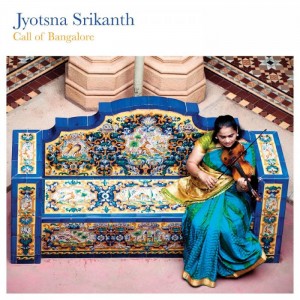 De Zuid Indiase stad Bangalore staat model voor de Karnatische muziek van violiste Jyotsna Srikanth. Deze van oorsprong gezongen muziek speelt Srikanth innemend op haar nieuwe cd ‘Call of Bangalore’. Ze wordt bijgestaan door Patri Kumar op de mridangam: dubbelzijdig bespeelde trommel en N. Amruth bespeelt de khanjira: kleine framedrum.
De Zuid Indiase stad Bangalore staat model voor de Karnatische muziek van violiste Jyotsna Srikanth. Deze van oorsprong gezongen muziek speelt Srikanth innemend op haar nieuwe cd ‘Call of Bangalore’. Ze wordt bijgestaan door Patri Kumar op de mridangam: dubbelzijdig bespeelde trommel en N. Amruth bespeelt de khanjira: kleine framedrum.
English version below
Karnatische muziek, van oorsprong te vinden in heel India, komt tegenwoordig alleen nog voor in het zuiden. In de 15de eeuw veroverden de Mughal het noorden en verdreven de Hindoestanen naar Zuid-India. De muziek is mondeling overgeleverd en dus niet genoteerd, op een paar vingerzettingen notaties na en is gebaseerd op de tala: ritmisch patroon en de raga: toonreeks. De meest gebruikt Karnatische instrumenten zijn de veena: de Zuid Indiase equivalent van de sitar, de bansuri (fluit) en de nagaswaram: een groot dubbelrietinstrument.
De in Londen wonende violiste Jyotsna Srikanth speelt Karnatische muziek. Klassiek geschoold en regelmatig op zoek naar jazz experimenten met Indiase invloeden. Na een visa probleem van enkele zangers, was Jyotsna Srikanth in 2010 genoodzaakt een concert te geven met twee voor haar onbekende percussionisten. Deze ontmoeting beviel zo goed dat ze nu de cd ‘Call of Bangalore’ heeft uitgebracht. Ze speelt daarop in de gâyaki stijl, dat ‘alsof het gezongen wordt’ betekent. En zo klinkt haar spel ook: alsof ze de melodie zingt op haar viool. De muziek wisselt van driftig opgewonden naar gepassioneerd met bijzonder fraaie versieringen. Alles prachtig en trefzeker gespeeld. Het repertoire op ‘Call of Bangalore’ is een gemêleerde keuze van traditionele stukken van o.a. de legendarische Muttuswamy Dikshitar (1776-1835). Een componist die gerekend wordt tot de Trimurti: de drie-eenheid van de drie belangrijkste Karnatische componisten, naast Tyagaraja en Syama Sastri. Met ‘Call of Bangalore’ keert Jyotsna Srikanth terug naar India dat ze muzikaal eigenlijk nooit heeft verlaten.
English version
The Southern Indian city Bangalore is the town of Karnatic violinst Jyotsna Srikanth. This original ‘sung’ music is played extremely well by Srikanth on her new cd ‘Call of Bangalore’. She’s assisted by Patri Kumar on the mridangam: doubelsided drum and N. Amruth on the khanjira: small frame drum.
Orginally Karnatic music is found all over India but nowadays only in the south. In the 15th century the Mughal conquered the North and expelled the Hindu to the South of India. The music is handed over by oral tradition and not notated and based on the tala, rhythm pattern and raga: tone scale. The most used Karnatic instruments are the veena: South Indian equivalent for the sitar, the bansuri (flute) and the nagaswaram: big double reet instrument.
London based violinist Jyotsna Srikanth plays Karnatic music. Classical educated and regular experimenting with jazz and Indian related music. After visa problems with a few singers, Jyotsna Srikanth was obliged to give a concert with two percussionist. This occasion felt so good, that she decided to record a new album: ‘Call of Bangalore‘. She plays in the gâyaki style: ‘as if sung’. Yes indeed: the violin is played, like it sings the melody. Jyotsna Srikanth’s repertoire changes easily from drifting and exciting to passionate with lovely ornaments. All played beautiful and precisely. ‘Call of Bangalore’ is a varied choice of traditional pieces, written for example by the legendary Muttuswamy Dikshitar (1776-1835), a composer who’s one of the Trimurti: the trinity of three most important Karnatic composers: Tyagaraja and Syama Sastri. With ‘Call of Bangalore’ Jyotsna Srikanth returns to India, the land which she musically never left.
- Jyotsna Srikanth: ‘Call of Bangalore’ (World Music Network/Music&Words)
© Mattie Poels.

Schitterende virtuositeit.!